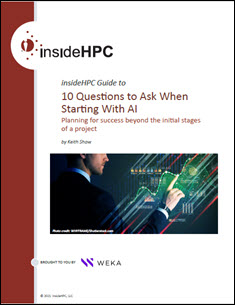Microsoft has announced the general availability of Azure OpenAI Service, the result of a partnership with OpenAI whose ChatGPT generative AI application has created a sensation since its late November launch that generated 1 million-plus downloads in its first week. The announcement follows last week’s news that Microsoft was in talks to invest $10 billion […]
The true cost of AI innovation
“As the world’s attention has shifted to climate change, the field of AI is beginning to take note of its carbon cost. Research done at the Allen Institute for AI by Roy Schwartz et al. raises the question of whether efficiency, alongside accuracy, should become an important factor in AI research, and suggests that AI scientists ought to deliberate if the massive computational power needed for expensive processing of models, colossal amounts of training data, or huge numbers of experiments is justified by the degree of improvement in accuracy.”
Big Compute Fireside Chat with Sam Altman from OpenAI
In this video from the Big Compute 2020 event, Sam Altman from the OpenAI research laboratory discusses artificial intelligence Shawn Hansen, COO of Rescale. “I think of the most exciting developments in the field in the last few years has been how good AI for natural language is getting. I think we are going to see an explosion in the next few years of systems that can really process, understand, and interact with general language. It will, I think, be the first way that people really feel powerful AI. Because you’ll be able to interact with the systems like you do by talking to somebody else. You’ll be able to have dialogue that actually makes sense. And computers will be able to process huge volumes of text that are sort of very unstructured.”
Nvidia Donates DGX-1 Machine Learning Supercomputer to OpenAI Non-profit
This week Nvidia CEO Jen-Hsun Huang hand-delivered one of the company’s new DGX-1 Machine Learning supercomputers to the OpenAI non-profit in San Francisco. “The DGX-1 is a huge advance,” OpenAI Research Scientist Ilya Sutskever said. “It will allow us to explore problems that were completely unexplored before, and it will allow us to achieve levels of performance that weren’t achievable.”






